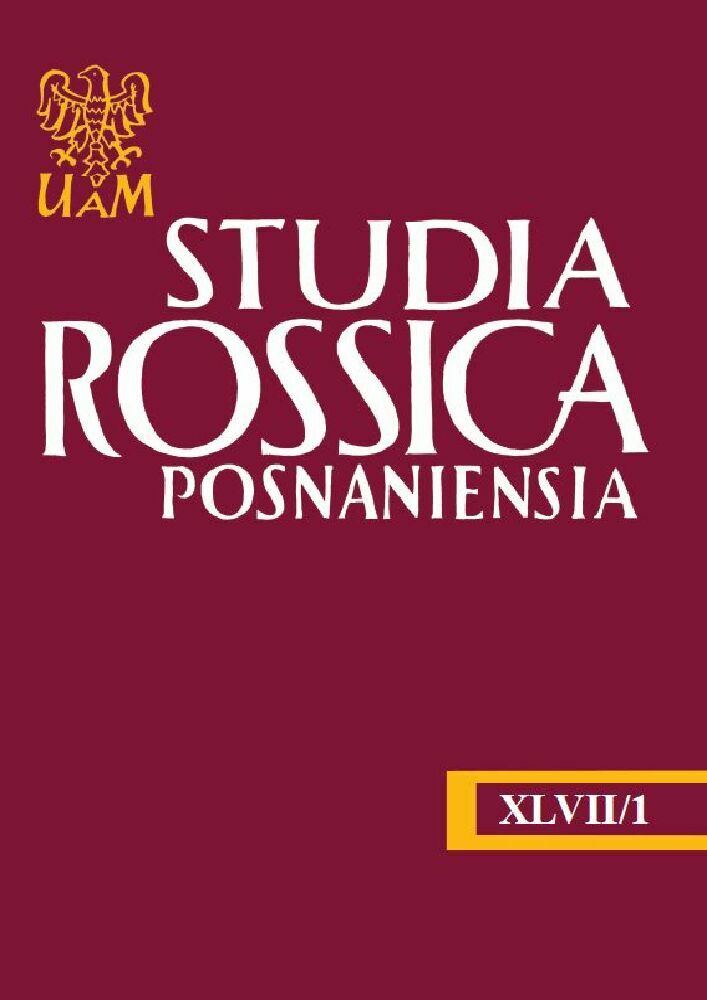Аннотация
The article considers comic humour as an emotional and semantic component of the statements in two comedies written by Nadezhda Ptushkina: Paying ahead and Come and take away, which can be attributed to popular mass literature. Distinguishing between the manifestations of situational and semantic comedy and humour the article shows how the humorous tone of the character’s remarks changes the overall genre tone of the comedy. Due to the idea of how much the personality does not fit into the narrow framework of the stereotypical perception of the situation of the husband’s withdrawal from the family, the article notes the dramatic and tragic modality of the statements in the plays. At the same time, in all situations and in all manifestations of the relationship between the characters, we feel the author’s view. The author is distinguished by the ability to understand and accept a different opinion to optimistically see the possibility of preserving the family and identity of each person in the process of collisions with other opinions. Despite the author’s rejection the play retains a belief in a certain general harmony of the human soul, which is especially vividly perceived thanks to allusions to Chekhov’s plays. Techniques contribute to the removal of the author’s view and the positions of the characters: dialogue of the deaf, distancing the author’s view and the character’s position, wordplay. All these techniques contribute to overcoming the farcical nature of the conflict and its dramatization.
Библиографические ссылки
Čehov, Anton. Dâdâ Vanâ. Web. 25.08.2021. https://ilibrary.ru/text/972/p.1/index.html.
Davydova, Marina. Teatr i ego sovremennik. Segodnâ otkryvaetsâ festivalʹ «Novaâ drama». Web. 21.08.2021. http://www.smotr.ru/pressa/2001_newdrama.htm#vn.
Dziemidok, Bohdan. O komizmie. Od Arystotylesa do dzisiaj, Gdańsk, Słowo/obraz terytoria, 2011.
Hazova, Svetlana. „Ûmor kak resurs sovladaûŝego povedeniâ”. Sibirskij pedagogičeskij žurnal, 3, 2012, s. 177–182.
Iŝuk-Fadeeva, Nina. „Novaâ drama: filosofskie istoki i poètičeskie novacii”. Vestnik kulʹturologii, 1, 2012. Web. 27.08.2021. https://cyberleninka.ru/article/n/novaya-drama-filosofskie-istoki-ipoeticheskie-novatsii/viewer.
Kislova, Larisa. „«Zerkalʹnoe» protivodejstvie v dramaturgii Nadeždy Ptuškinoj”. Novejšaâ drama rubeža XX–XXI vekov: problema dejstviâ. Samara, Samarskij uniwersytet, 2014.
Kozincev, Aleksander. „Ûmor: do i posle ironii”. Âzykovye mehanizmy komizma. Moskva, Indrik, 2007, s. 238–252.
Lilientalʹ, Galina. „K voprosu o vozmožnosti razgraničeniâ lingvističeskogo i situativnogo ûmora”. Vestnik SPBGU, 9, 2014. Web. 25.08.2021. https://cyberleninka.ru/article/n/k-voprosu-o-vozmozhnosti-razgranicheniya-lingvisticheskogo-i-situativnogo-yumora/viewer.
Minskij, Marvin. Ostroumie i logika kognitivnogo bessoznatelʹnogo. Web. 25.08.2021. https://classes.ru/grammar/164.new-in-linguistics-23/source/worddocuments/m1.htm.
Musijčuk, Maria. Kognitivnye mehanizmy struktury komičeskogo: filosofsko-metodologičeskie aspekty. Novosibirsk, Lambert, 2012.
Musijčuk, Maria. „Ponimanie implicitnogo smysla kak osnova kreativnogo mehanizma ûmora”, Vestnik NGU, 5 (1), 2007. Web. 25.08.2021. https://nsu.ru/xmlui/bitstream/handle/nsu/7036/05.pdf.
Petrovskij, Nikandr. Slovarʹ ličnyh imen. Moskva, 1980. Web. 25.08.2021. https://lexicography.online/onomastics/petrovsky/.
Ptuškina, Nadežda. Plaču vpered. 1999. Web. 25.08.2021. https://ptushkina.com/PiecePDF/Pla4u_vpered.pdf.
Ptuškina, Nadežda. Prihodi i uvodi. 1997. Web. 25.08.2021. https://ptushkina.com/PiecePDF/Prixodi_uvodi.pdf.
Rokotânskaâ, Lûdmila. Ûmor: suŝnostʹ, vidy, funkcii v obŝestve. Avtoreferat kandidatskoj dissertacii. Moskva, 2020.
Szondi, Peter. Teoriâ sovremennoj dramy. Izdatelʹstvo V-A-C press, Moskva, 2020.
Tûtelova, Larisa. „Problema prostranstvennoj točki zreniâ v drame”. Kulʹtura i tekst, 4 (39), 2019.
Wachowski, Jacek. „O komizmie, śmieszności i nie tylko…”. Ko-mediana. Prace ofiarowane Profesor Dobrochnie Ratajczakowej. Red. Ewa Guderian-Czaplińska, Krzysztof Kurek. Poznań, Poznańskie Studia Polonistyczne, 2013.
Žurčeva, Olʹga. Avtor v drame: formy vyraženiâ avtorskogo soznaniâ v russkoj drame XX veka. Samara, Izdatelʹstvo SGPU, 2007.


